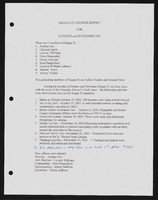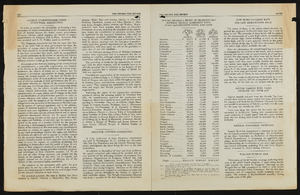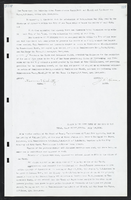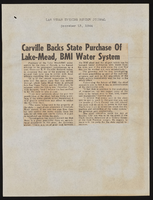Search the Special Collections and Archives Portal
Search Results

Long Range Planning Study for Temple Beth Sholom, July 1988
Date
Archival Collection
Description
This report provides the results of a study conducted by CITYWEST, Inc., to "determine whether the synagogue should remain in its current location and be renovated, remain in its current location and rebuild, or move." The report addresses leadership and staff development, as well as programming recommendations.
Text
Charleston Proto, 1994 June 10
Level of Description
Scope and Contents
This set includes: floor plans, exterior elevations, wall sections, foundation plans and interior elevations.
This set has the same project number as Animal Care Facility but is named Charleston Proto.
Archival Collection
Collection Name: Gary Guy Wilson Architectural Drawings
Box/Folder: Roll 025
Archival Component
Architectural Drawings, 1965-2010
Level of Description
Scope and Contents
The architectural drawings series are comprised of architectural drawings (1965-2010) created by the American architecture firms of Welles Pugsley Architects and Leo A Daly Architects documenting work on the design and construction of Lied Library at UNLV. The materials feature hand-drawn architectural drawings, ranging from preliminary sketches and artist renderings to schematic drawings and construction documents. The drawings also contain work from a number of consultants, engineers, and other professionals who collaborated on the development of the various projects. These include several sets of original construction documents that the architects used for reference while working on the Lied Library project.
A typical set of drawings in the architectural drawings series may include: title sheet, index, topographic survey, supplemental resurvey map, plot plan, site plan, floor plans, exterior elevations, interior elevations, building sections, wall sections, construction details, foundation plans, roof plans, reflected ceiling plans, structural plans, structural details, electrical plans, electrical details, electrical diagrams, plumbing details, plumbing plans, plumbing diagrams, interior perspective, exterior perspective, mechanical plans, mechanical details, mechanical diagrams, and landscape layout.
Archival Collection
Collection Name: University of Nevada, Las Vegas Lied Library Architectural Records
Box/Folder: N/A
Archival Component

Alpha Kappa Alpha Sorority, Theta Theta Omega Chapter graduate advisor reports
Date
Archival Collection
Description
From the Alpha Kappa Alpha Sorority, Incorporated, Theta Theta Omega Chapter Records (MS-01014) -- Chapter records file.
Text

Alpha Kappa Alpha Sorority, Theta Theta Omega Chapter Founders' Day committee reports
Date
Archival Collection
Description
From the Alpha Kappa Alpha Sorority, Incorporated, Theta Theta Omega Chapter Records (MS-01014) -- Chapter records file.
Text
Edwin "Tony" Wuehle oral history interview
Identifier
Abstract
Oral history interview with Edwin "Tony" Wuehle conducted by David Schwartz on December 21, 2006 for the Boyer Early Las Vegas Oral History Project. In this interview, Wuehle discusses his early life in Hettinger, North Dakota and his career as an educator. He recalls his first experiences playing poker, participating in home poker games while living in Michigan’s Upper Peninsula, and using a pseudonym as a player. Wuehle then talks about writing a book, founding the Gamblers Book Club Press in Las Vegas, Nevada, and writing for religious publications. Later, Wuehle explains the tension between participating in religion and playing poker. He describes Las Vegas poker rooms during the 1960s and 1970s and shares his thoughts on online poker. Lastly, Wuehle discusses why casinos use prop players and his efforts to organize a poker tournament to raise funds for Bay de Noc Community College in Michigan.
Archival Collection
Audio recording clip of interview with Jean Bennett by Claytee D. White, July 8, 2008
Date
Archival Collection
Description
Part of an interview with Jean Bennett by Claytee White on July 8, 2008. Bennett describes how black entertainers were treated by the casinos.
Sound



